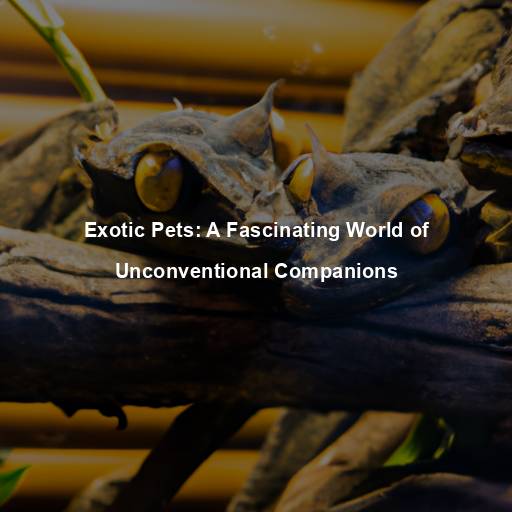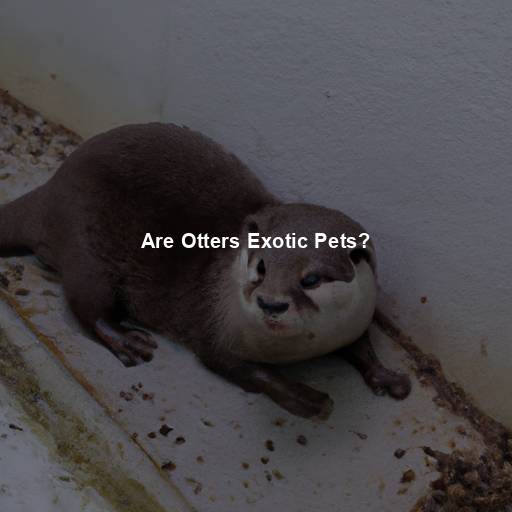Exotic Pets: Understanding the Legality of Owning Unusual Animals in California
Last Updated on October 30, 2023 by Evan
Contents
- 1 Understanding the Fascination with Exotic Pets
- 2 Understanding California’s Exotic Pet Laws
- 3 Navigating the Legalities: Resources and Support
- 4 Promoting Responsible Pet Ownership
- 5 The Ethical Dilemma of Exotic Pet Ownership
- 6 FAQs: What Exotic Pets are Illegal in California?
- 6.1 What are considered exotic pets in California?
- 6.2 Which exotic pets are illegal to own in California?
- 6.3 Are there any exceptions or permits available to own these pets?
- 6.4 Can I keep a pet reptile that is not native to California?
- 6.5 Are there any restrictions on pet birds in California?
- 6.6 Can you keep exotic insects as pets in California?
- 6.7 What are the penalties for owning illegal exotic pets in California?
Understanding the Fascination with Exotic Pets
Exotic pets have always captivated the human imagination, offering a window into the wild and untamed world. From stunning reptiles to magnificent birds and intriguing mammals, these unique creatures have a certain allure that can be hard to resist. However, the ownership of exotic pets comes with a set of legal and ethical considerations that vary from one place to another. In the state of California, specifically, there are stringent regulations in place to protect both the animals and the general public.
The Complex Legal Landscape of Exotic Pet Ownership
California has taken a proactive stance when it comes to regulating the ownership of exotic animals. The state’s laws aim to prevent the introduction of non-native species, protect public health and safety, and safeguard the well-being of animals that may be unsuitable for domestic environments. It is worth noting that these laws are in place to ensure the welfare of both animals and humans, as exotic pets require specialized care that can be challenging to provide within a domestic setting.
Understanding California’s Exotic Pet Laws
The California Department of Fish and Wildlife
The California Department of Fish and Wildlife (CDFW) plays a crucial role in regulating the ownership of exotic pets. They oversee the enforcement of laws and regulations related to wildlife conservation and the protection of native species. It is important to consult the CDFW when considering the ownership of an exotic animal, as they can provide guidance on legal requirements and potential restrictions.
Prohibited Species
California has a comprehensive list of prohibited species, which includes animals that are illegal to possess as pets within the state. This list is regularly updated to address emerging threats and potential risks associated with certain species. It is essential for prospective exotic pet owners to familiarize themselves with this list to avoid any legal issues.
Restricted Species
Did you know that there is a whole other category of animal ownership besides the well-known prohibited species? It’s called restricted species, and it’s a world filled with intriguing circumstances and special permits. Owning these animals comes with its own set of perplexing rules and regulations, all in place to make sure that they receive the proper care and housing they deserve. It’s a fascinating realm that highlights the complexities and responsibilities of being a caretaker for these extraordinary creatures.
Examples of Prohibited Exotic Pets in California
Let’s embark on an intriguing journey into the enigmatic world of California’s forbidden creatures, delving deep into a captivating exploration of these clandestine inhabitants. Brace yourselves for a glimpse into the forbidden territories of the animal kingdom that reside within the Golden State’s borders. From exotic reptiles to elusive mammals, behold the mysterious roster of unauthorized companions that bewilder and perplex even the most seasoned animal enthusiasts.
Step into the world of the enchanting Fennec Fox, a captivating creature that hails from the mystical Sahara Desert. With their irresistible charm, it’s no wonder why these petite foxes have captured the hearts of many. However, as fascinating as they may be, owning a Fennec Fox as a pet comes with its fair share of challenges and responsibilities. From their unique dietary requirements to the intricate ecosystem dynamics, replicating their natural habitat within the confines of a domestic setting can be a perplexing task.
-
Cheetahs: Known for their incredible speed and grace, cheetahs are prohibited as pets due to their specialized care requirements and the potential danger they may pose to humans.
-
Gibbons: These agile primates are not suitable as pets, as they require complex social interactions, large and naturalistic enclosures, and specialized diets.
Did you know that keeping reptiles as pets can sometimes lead to unexpected challenges? Take crocodiles for example: these magnificent creatures are not suitable for domestic life. Their large size, aggressive nature, and potential threats to public safety make it clear why they are prohibited as pets. The complexities surrounding their care and the uncertain outcomes of such an arrangement are enough to leave anyone in a state of perplexity.
Discover the enigmatic allure of tigers, captivating creatures that possess an innate air of mystery. In the mesmerizing state of California, however, it is important to note that owning these majestic big cats as pets is strictly prohibited. This prohibition stems from a myriad of reasons including their inherent predatory instincts, unique dietary requirements, and the potential risks they pose to human safety.
It’s important to keep in mind that the list of prohibited species in California is by no means exhaustive. In fact, it’s just the tip of the iceberg, encompassing a diverse array of animals that are off-limits. From reptiles to primates, large cats to venomous snakes, the complete roster is as perplexing as it is extensive.
Responsible Ownership and Ethical Considerations
Owning an exotic pet can be quite enticing, but we must pause to ponder the ethical dilemmas and profound responsibilities that accompany such a choice. These captivating creatures possess intricate care demands, posing formidable challenges within a domestic setting. One must fully grasp their innate behaviors, intricate dietary needs, and the critical significance of environmental enrichment to safeguard their overall welfare.
In the captivating world of pet ownership, it becomes paramount to ponder the perplexing reality surrounding the acquisition of exotic animals. These vibrant creatures, so tantalizing in their uniqueness, often find themselves ensnared in the clutches of illegal wildlife trafficking. Alas, this dubious enterprise not only imperils endangered species but also disturbs the delicate balance of ecosystems. To curtail such disarray, the promotion of responsible pet ownership and the simultaneous discouragement of the insatiable desire for exotic companions become our solemn duty.
Environmental Concerns
The enthralling world of exotic pets, with its mystique and allure, casts a bewildering light on the environmental landscape. As we delve deeper beneath the surface, we uncover a perplexing truth – the ownership of these captivating creatures can have far-reaching and consequential effects on our delicate ecosystems. When these non-native species venture into uncharted territories, the equilibrium of local flora and fauna begins to shiver and shake, raising disconcerting questions about our responsibility to safeguard biodiversity. In the vibrant tapestry of life, it is vital to recognize the potential release of exotic pets into the wild as a risk that could further entangle us in the web of environmental intricacies.
Public Safety Considerations
When it comes to keeping exotic pets, the issue of public safety takes center stage. It’s not just about the allure of having majestic creatures like big cats or venomous snakes, but also about the risks they may pose to humans. Even seemingly harmless animals can unleash unexpected aggression or cause harm due to their innate instincts. By placing restrictions on the ownership of certain exotic species, California is paving the way for a safer environment that protects both individuals and communities alike.
Animal Welfare and Ethical Concerns
The welfare of exotic animals is a significant ethical concern when it comes to pet ownership. These animals have evolved to thrive in specific environments, and meeting their complex needs within a domestic setting can be challenging. Exotic pets often require specialized diets, spacious enclosures, and opportunities for natural behaviors. Failure to provide adequate care can result in stress, health issues, and compromised well-being for these animals.
Navigating the intricate web of legalities when it comes to owning exotic pets can certainly leave one feeling a bit bewildered. The convoluted regulations can easily trigger a sense of overwhelm. Nevertheless, fret not, as there are plenty of resources at your disposal to empower you with the knowledge needed to make well-informed decisions in this perplexing realm.
California Department of Fish and Wildlife (CDFW)
When it comes to exotic pet ownership, navigating the labyrinth of laws and regulations in California can leave prospective owners feeling like they’re lost in a dense jungle. Thankfully, the California Department of Fish and Wildlife (CDFW) emerges as the guiding compass, shedding light on all the do’s and don’ts of this fascinating yet perplexing world. A treasure trove of information, their website serves as a virtual menagerie, offering a deep dive into the realm of prohibited and restricted species, alongside the ever-elusive permit requirements and legal intricacies that govern exotic pet ownership in the state. So, before embarking on this exotic adventure, make sure to consult the CDFW, your ultimate source of clarity in this captivating yet bewildering domain.
Reputable Exotic Animal Organizations and Sanctuaries
If you’re fascinated by exotic animals and dream of owning one, it’s crucial to seek counsel from credible sources. Reputable organizations and sanctuaries dedicated to these unique creatures can be invaluable resources, offering valuable knowledge and guidance. From ethical considerations to responsible ownership, these experts have a wealth of information to share. Moreover, they can provide insights into adoption programs or opportunities to contribute to conservation efforts.
Local Veterinarians and Animal Experts
When it comes to welcoming exotic pets into your home, navigating the diverse world of care requirements can be a head-spinning experience. Luckily, tapping into the knowledge of local veterinarians and esteemed animal experts can prove to be an invaluable resource. By seeking their guidance, future pet parents can delve into the intricacies of exotic pets’ health and overall satisfaction. These esteemed professionals offer a priceless wealth of information, from diet recommendations to crafting suitable habitats and fostering mental stimulation.
Promoting Responsible Pet Ownership
There’s something intriguing and perplexing about the laws and regulations surrounding exotic pet ownership in sunny California. At first glance, they may appear restrictive, but delve deeper and you’ll discover a complex web of rules designed to foster responsible ownership and ensure the wellbeing of both our furry friends and ourselves. It’s an intricate dance between considering the welfare of these enchanting creatures, the environmental impact they may have, and the labyrinth of legalities that come into play. So, before embarking on this captivating path, pause and ponder the perplexities that lie beneath the surface – ensuring a harmonious coexistence with our exotic companions.
Alternative Ways to Appreciate Exotic Animals
If the allure of exotic animals captivates you, yet circumstances prevent you from owning one, fear not! A world of alternative avenues awaits to quench your thirst for the extraordinary. Accredited zoos, wildlife sanctuaries, and educational centers eagerly throw open their gates, inviting you to step into a realm where you can marvel at these majestic creatures while upholding the utmost ethical standards. Engage in conservation programs or lend your support to organizations dedicated to safeguarding the well-being of these unique species, and bask in the knowledge that you are making a tangible, positive impact.
Ethical Considerations and Conservation Efforts
Supporting ethical conservation efforts is crucial for the long-term survival of exotic species. By focusing on habitat preservation, combating wildlife trafficking, and promoting sustainable practices, we can contribute to the protection of these magnificent creatures in their natural environments. Educating ourselves and others about the importance of conservation and responsible pet ownership can help foster a greater understanding and appreciation for the unique beauty and value of exotic animals.
Educating the Public
An essential aspect of responsible exotic pet ownership is educating the public about the challenges and responsibilities involved. By raising awareness about the legalities, ethical considerations, and care requirements associated with exotic pets, individuals can make informed decisions and avoid potential pitfalls. Public education campaigns, workshops, and informational resources can play a vital role in promoting responsible ownership and reducing the demand for exotic pets.
Encouraging Adoption and Rescue
One way to support ethical practices in exotic pet ownership is by promoting adoption and rescue programs. Many exotic animals find themselves in need of a new home due to various circumstances, such as owners who can no longer care for them or animals confiscated from illegal trafficking operations. Encouraging adoption and rescue not only provides a second chance for these animals but also helps combat the demand for wild-caught or illegally bred exotic pets.
Supporting Conservation Efforts
The delicate dance of safeguarding endangered species and their precious habitats relies heavily on the tireless efforts of conservation champions. Offering unequivocal support to organizations ardently devoted to the preservation of these awe-inspiring creatures allows individuals to become unsung heroes in the struggle to maintain species diversity in their untouched realms. Whether through heartfelt donations, selflessly dedicating time as volunteers, or fervently championing awareness about conservation ventures, the potential to forge a substantial ripple effect and secure the perpetual existence of these extraordinary species is boundless.
The Ethical Dilemma of Exotic Pet Ownership
Balancing Personal Desire with Animal Welfare
There’s something undeniably enchanting about the allure of owning an exotic pet. The sparks of fascination and love that these extraordinary creatures ignite within us can be truly captivating. Yet, in this whirlwind of desire, we must pause and consider the perplexing question of whether our dreams align with the well-being of these animals. It becomes imperative for us to embark on a journey of self-reflection, questioning our ability to provide the utmost care, cater to their specialized needs, and ensure their long-term welfare.
Ethical Alternatives: Eco-Tourism and Volunteer Work
Are you someone who craves the thrill of encountering exotic animals but also values ethical practices? Look no further – we’ve got the scoop on alternative options that prioritize conservation and environmental sustainability. Forget about exploitative activities – immerse yourself in the wonders of eco-tourism, where you can embark on wildlife safaris and observe these magnificent creatures in their natural habitats, all while leaving minimal impact on their lives. If you’re truly passionate about making a difference, consider volunteering with reputable conservation organizations, where you’ll get hands-on experiences and the chance to contribute to protecting these incredible species.
Shifting Cultural Attitudes
As society evolves, our outlook on exotic pet ownership undergoes an intriguing metamorphosis. Embracing this gradual transformation necessitates an intricate blend of knowledge dissemination, heightened consciousness, and the propagation of ethical substitutes. By unlocking the intricacies surrounding these matters and shedding light on the significance of safeguarding our delicate ecological balance, we can instigate a profound shift in how we regard these captivating creatures from mere possessions to invaluable treasures of the natural realm. Augmenting empathy and reverence for all living beings holds the key to fostering a more compassionate and enlightened society.
FAQs: What Exotic Pets are Illegal in California?
What are considered exotic pets in California?
Exotic pets refer to any animal species that is not commonly kept as a pet or typically found in domestic homes. These can include certain types of wild animals, reptiles, birds, and even some insects. While some people find these unique pets fascinating, it’s essential to understand which ones are illegal to keep in California.
Which exotic pets are illegal to own in California?
California has a strict set of regulations when it comes to exotic pets. Some of the animals that are generally illegal to possess as pets in the state include large cats (such as lions, tigers, and cheetahs), non-human primates (monkeys, apes), large constrictor snakes (like pythons and boa constrictors), and specific venomous snakes. Additionally, many species of crocodiles, alligators, and caimans are also prohibited.
Are there any exceptions or permits available to own these pets?
California’s enigmatic laws on exotic pet ownership leave room for curiosity and bewilderment. Within the fog of legal jargon, a glimpse of exception emerges, revealing a tantalizing possibility. Though large felines, non-human primates, and formidable constrictor snakes are officially off-limits, a peculiar clause grants clemency to those who previously embraced these creatures. Yet, the path to peculiar companionship is fraught with uncertainty, as stringent enclosure protocols and the acquisition of permits lurk like enigmatic gatekeepers.
Can I keep a pet reptile that is not native to California?
Yes, you can legally keep certain reptile species that are not native to California, as long as they are not on the list of restricted species. However, it is essential to ensure that reptiles are obtained legally from reputable breeders or in compliance with state and federal laws governing the sale and importation of such animals.
Are there any restrictions on pet birds in California?
While there are no statewide restrictions on the ownership of birds in California, various city or county ordinances may dictate the types and numbers of birds one can keep. These may include regulations on noise levels, enclosure requirements, or specific permits for certain species. It is advisable to consult local authorities or check local regulations before acquiring a pet bird.
Can you keep exotic insects as pets in California?
In general, it is legal to keep exotic insects as pets in California, as long as they are not potentially harmful or invasive species. However, it is strongly recommended to research and ensure that the species being considered are safe to keep and do not pose a risk to the environment or public health. Always acquire insects from reputable breeders or sellers.
What are the penalties for owning illegal exotic pets in California?
Having illegal exotic pets in California is a situation that could lead to more trouble than one might expect. Not only can authorities step in and take the animals away, there’s also the potential for fines, court battles, and even criminal charges. As if that weren’t enough, some of these restricted species can pose serious risks, both to human beings and the delicate balance of our environment. All in all, it’s a perplexing and bursty situation that no one wants to find themselves in.
It is vital to understand and abide by California’s regulations regarding exotic pet ownership. If in doubt about the legality of owning a specific animal, consult local and state authorities who can provide the most accurate and up-to-date information.







